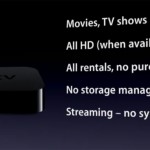And so another week is upon us. Not much news this week though, but there was one big breaking story, which we’ll get to soon enough. The PlayStation Move has been released since I last posted, and there’s a bit more on that in the gaming section, although I do plan on writing a short little comparison between the Move and Kinect, or rather, why a direct comparison between the two motion gaming accessories is a bit silly, and that one doesn’t necessarily have to lose in order for the other to win (unfortunately, the Wii loses in either scenario).

In copyright news, the big news of the week I alluded to earlier is that HDCP, the copy protection scheme we’ve all learned to love, is dead.
It was short lived, we hardly knew thee, but HDCP copy protection has been cracked, with the master key posted on Twitter of all places. People at first were sceptical, but a few days later, we had confirmation from Intel, the company that developed HDCP, that, yes, the posted key was in fact the legitimate master key. So what does the master key do? Well, it the way HDCP works, it allows legitimate source keys (keys for things like Blu-ray players) and sink keys (keys for receiving devices, mainly TVs and monitors) to be generated, and therefore it means that there is no way now to tell the difference between authorised devices, and unauthorised ones, thus killing HDCP as a viable DRM scheme. Well some articles screamed that “Blu-ray copy protection has been killed”, it isn’t quite that simple. Yes, Blu-ray players rely on HDMI and therefore HDCP copy protection, but the disc itself is still protected by several other layers of DRM, including AACS. However, it will now be possible to intercept the HDMI output and get access to the raw digital stream to make copies of the movie, although that will require a bit of hardware ingenuity, although something could be done in software too. Those around when DVD ripping first came onto the scene will remember Power Ripper, the tool that used PowerDVD’s screen capture tool to rip DVDs, frame by frame. Since then, many DRM schemes have protected this sort of ripping by disabling screen capture or encrypting the path from software to screen. But with HDCP out of the way, this kind of ripping may be possible again (and this time, since HDMI carries audio too, the whole stream can be riped). Of course the question is why would anyone want to do this when there are much easier ways to rip Blu-ray movies? But there are also other applications other than ripping, such as allowing movies to still be played via HDMI even when the TV’s HDCP chip has died.
But the most important aspect of this leak of the master key is that it confirms once again relying on technical measures to prevent piracy is an extremely naive strategy. There are people that crack HDCP for fun, and it doesn’t matter if it takes a month, or 5 years, they have the time! Now, Intel has hinted that since the technical protection is all but gone, they may rely on legal protection to keep HDCP viable. After all, it’s worked for DVD’s CSS, which has been cracked since 1999 and yet it’s still widely in use today, largely thanks to the legal protection it, and any DRM scheme (no matter how weak), offers (thanks to the DMCA). But even legal protection won’t stop people doing things that annoys rightsholders, once the technical barriers have been removed. So HDCP will still be around, and all your TVs and Blu-ray players will use it, but once again, you have to ask, what’s the point? Having some crappy DRM in there makes lawsuits simpler, but copyright infringement is copyright infringement, it doesn’t really matter to the court if DRM has been broken once, a hundred times, or that DRM didn’t exist at all. And when the DRM negatively impacts on legitimate customer’s user experience, then one should wonder if this is a fair deal, that legitimate customers have to pay dearly just to give rightsholders a false sense of security (but I guess a false sense of it is better than nothing, which is why companies are still paying a lot of money to license DVD’s CSS).
Technical, legal ways to fight piracy has obviously failed, and continues to demonstrate how it fails every single day, whether it’s HDCP, or France’s Three-Strikes, or multi-million dollar settlements being thrown out of court for being unconstitutional. The common sense approach would then to be to find another way to fight piracy, perhaps a way where rightsholders can get loyal customers to join their battle, no, not by paying out rewards for dobbing your friends and family, but by making sure that paying customers want to stay paying customers because they are treated right. So right that even those that aren’t paying would start to envy those that are paying, and would do so if they could afford it. Whether this means making the whole experience so much easier than going out and obtaining the pirated version, or if it means more exclusive content and experiences that cannot be pirated, or even just making the price so reasonable that, it makes it not worthwhile to pursue pirated content. I firmly believe such a solution is possible, and in the end, everyone will benefit.
Or you can just launch DDoS attacks on BitTorrent websites. But if you use less than ethical and possibly illegal tactics, then don’t be surprised if the response is of a similar nature. Last week, I mentioned the story of an Indian based anti-piracy firm, AiPlex, who appeared to have owned up to launching DDoS attacks on BitTorrent website. So this week, a group from 4chan, called Anonymous, have decided that the right response is to DDoS AiPlex’s website. And attack they did, bringing the entire website down for hours. And not only that, they decided to attack the MPAA website too, also bringing it down for several hours. Both websites appear to be back up again this afternoon, after having changed IP addresses, but it’s unknown at this point if the attacks will continue (both sites appear to be slowing down again, which could signal the start of a new attack, or just that I have a crappy Internet connection). Now, I don’t think many people will condone DDoS and similar attacks, but that’s exactly why people were shocked to discover that AiPlex had resorted to such actions in the first place.
Over to the UK, Internet users over there will soon have to pay to be spied on by their ISPs, so the profits of record companies and other rightsholders can be protected. The government has announced that ISPs will have to foot 25% of the cost of anti-piracy operations, with the rest of the 75% being the rightsholder’s responsibility. You would think that rightsholders, you know the multi-billion dollar music and movie industries, would be happy with this arrangement, but they’re not. They had wanted ISPs to foot all of the bill, to even pay for the investigation part of the operation, and so wanted to contribute nothing in order to gain all the benefits. I should be surprised, but I’m not, because these are industries that are out there blaming everyone else for problems of their own creation (by that I mean not moving quickly enough to satisfy user needs, so the users found something better, cheaper).

Let’s move onto 3D/HD news. The good news is that the PS3 should be able to play 3D Blu-ray movies by this time next week, as apparently the “delayed” 3D Blu-ray firmware is now going to launch on time, on September 21st.
There’s very little detail about the exact implementation, so there’s all sorts of rumours on 3D Blu-ray being a bit more limited on the PS3 than compared to dedicated 3D Blu-ray players. One of the rumours suggest that when 3D is being played, BD-J/Java based menus can’t work at the same time. I find this highly unlikely though, since the PS3 has to still be the most powerful Blu-ray player out there (how many other Blu-ray players can do 1080p 3D rendering?). Another earlier rumour suggests that due to the older version HDMI on the PS3, especially the fat one, that 3D Blu-ray will not be full 1080p. This sounds more likely, but I think Sony has already refuted this suggestion. Anyway, we’ll know more in a few day’s time.
But while the update means the number of 3D Blu-ray players around the world has just jumped up quite a bit instantly, the number of 3D Blu-ray movies, on the other hand, is still barely above double digits. One problem many have noticed is that most of the movies released are tied to hardware, usually 3D TVs, and most are not available for general sale. Sometimes like 60% of the movies released or announced for release so far are this types of exclusives, including the big one, Avatar. And some say this will kill off the 3D Blu-ray format before it begins. I’m not sure I agree. Yes, the exclusive releases are an annoyance, it means many 3D Blu-ray owners, like myself, have access to a very limited number of movies (for me, I only have just the one). However, this is just the effect of the hardware-before-content model that 3D Blu-ray has adopted. And this causes the lack of content means manufacturers are even more protective of whatever content they can get their hands on, so they can make it an exclusive and sell more TVs. The alternative is to have content-before-hardware, but producing a 3D Blu-ray movie is quite costly possibly, as opposed to adding 3D to TVs, which isn’t costing manufacturers much at all (and in fact, they’re making more per TV because of the premium attached to 3D sets). In any case, Warner has just announced they will release 6 more 3D Blu-ray movies to general release for this holidays, including the “faux 3D” Clash of the Titans. Sony have also announced Open Season on 3D Blu-ray as well. But all eyes are on when Avatar is going to get a general release on 3D Blu-ray, and that will be the title to take the format to mainstream, I think.
![]()
And finally in gaming, the PlayStation Move is out and I thought I should briefly talk about it. Most people are wondering if Move will beat Kinect or the opposite, but really, the battle people should be looking at is whether Move can hurt the Wii, and I think it will.

One annoying thing about still using motion controllers is all the accessories you need to buy for it, no matter how cool they look
The similarities between the Move and the Wii makes the Move both harder to market, and easier. Easier because people already know what it’s all about, harder because many thinks it’s just a Wii clone. However, those that have played it (not me though) will almost always say one things: it’s very very accurate. That doesn’t sound as sexy as Kinect’s “look Ma, no controllers” advantage, but super accuracy can give motion gaming a whole new dimension. For traditional gaming, accuracy already makes a huge difference (think controller versus keyboard/mouse for FPS games). With motion gaming, accuracy will draw users more into the action, without them wondering why their real world movement of the controller isn’t being translated into the virtual world. And accuracy means the Move controller can be used for games that are more simulations than just random waving of the wand. And of course, accuracy makes for better player, and allows for more complicated games that require more intricate movement. Now whether this makes for better games, I’m not totally convinced yet, but the potential is there. And by being similar the Wii, but better, the Move positions itself as a potential Wii killer.
Kinect is a totally different animal. It’s a lot riskier, but if it succeeds, then Microsoft will have a truly unique product that offers something completely different to the Wii and Move. And this difference could either make or break Kinect, but I’m already seeing lots of signs where people generally tend to think of Kinect are more innovative, more fun, and these are two very critical factors in determining what’s the must have item for this holiday season. And not having to buy controllers, and the endless list of accessories for them (from steering wheels, to guns, to tennis racquets …), might be a plus for some.
And as I mentioned before, I might just write a blog comparing the two new motion control systems, and also whether the Wii is doomed.
But that’s the news for this week. A bad week for DRM, which in my book, means a good week. I wonder which DRM will get broken next week!

















